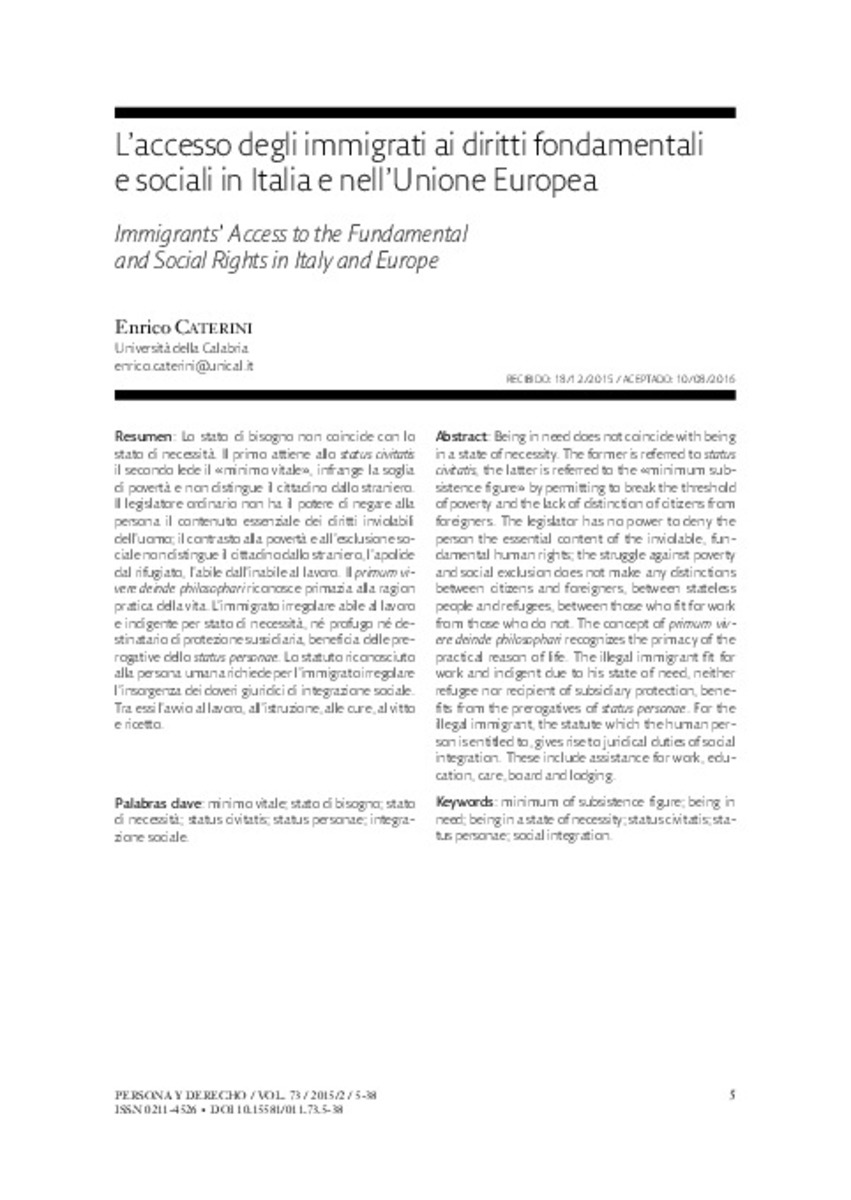Full metadata record
| DC Field | Value | Language |
|---|---|---|
| dc.creator | Caterini, E. (Enrico) | - |
| dc.date.accessioned | 2017-01-12T14:47:59Z | - |
| dc.date.available | 2017-01-12T14:47:59Z | - |
| dc.date.issued | 2015 | - |
| dc.identifier.citation | Caterini, E. (2015). Il «minimo vitale», lo stato di necessità e la lotta alla povertà. Revista Persona y Derecho, Nº 73, pp. 5-38 | es_ES |
| dc.identifier.issn | 0211-4526 | - |
| dc.identifier.uri | https://hdl.handle.net/10171/42672 | - |
| dc.description.abstract | Lo stato di bisogno non coincide con lo stato di necessità. Il primo attiene allo status civitatis il secondo lede il «minimo vitale», infrange la soglia di povertà e non distingue il cittadino dallo straniero. Il legislatore ordinario non ha il potere di negare alla persona il contenuto essenziale dei diritti inviolabili dell’uomo; il contrasto alla povertà e all’esclusione sociale non distingue il cittadino dallo straniero, l’apolide dal rifugiato, l’abile dall’inabile al lavoro. Il primum vivere deinde philosophari riconosce primazia alla ragion pratica della vita. L’immigrato irregolare abile al lavoro e indigente per stato di necessità, né profugo né destinatario di protezione sussidiaria, beneficia delle prerogative dello status personae. Lo statuto riconosciuto alla persona umana richiede per l’immigrato irregolare l’insorgenza dei doveri giuridici di integrazione sociale. Tra essi l’avvio al lavoro, all’istruzione, alle cure, al vitto e ricetto. | es_ES |
| dc.description.abstract | Being in need does not coincide with being in a state of necessity. The former is referred to status civitatis, the latter is referred to the “minimum subsistence figure” by permitting to break the threshold of poverty and the lack of distinction of citizens from foreigners. The legislator has no power to deny the person the essential content of the inviolable, fundamental human rights; the struggle against poverty and social exclusion does not make any distinctions between citizens and foreigners, between stateless people and refugees, between those who fit for work from those who do not. The concept of primum vivere deinde philosophari recognizes the primacy of the practical reason of life. The illegal immigrant fit for work and indigent due to his state of need, neither refugee nor recipient of subsidiary protection, benefits from the prerogatives of status personae. For the illegal immigrant, the statute which the human person is entitled to, gives rise to juridical duties of social integration. These include assistance for work, education, care, board and lodging. | es_ES |
| dc.language.iso | ita | es_ES |
| dc.publisher | Servicio de Publicaciones de la Universidad de Navarra | es_ES |
| dc.rights | info:eu-repo/semantics/openAccess | es_ES |
| dc.subject | Integrazione social | es_ES |
| dc.subject | Minimo vitale | es_ES |
| dc.subject | Stato di bisogno | es_ES |
| dc.subject | Status civitatis | es_ES |
| dc.subject | Status personae | es_ES |
| dc.subject | Stato di necessità | es_ES |
| dc.title | Il «minimo vitale», lo stato di necessità e la lotta alla povertà | es_ES |
| dc.title.alternative | Immigrants’ Access to the Fundamental and Social Rights in Italy and Europe | es_ES |
| dc.type | info:eu-repo/semantics/article | es_ES |
| dc.identifier.doi | 10.15581/011.73.5-38 | es_ES |
Files in This Item:
Statistics and impact
Items in Dadun are protected by copyright, with all rights reserved, unless otherwise indicated.






